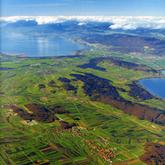CS 1994 "Grosses Moos (former Marshland): Sustainable agriculture"

The topic and major question of the 1994 case study can be summarized as follows: "The future use of agricultural land in the Grosses Moos integrated into the sustainable development of the entire regional ecosystem, within the existing legal framework." The Grosse Moos provides an example of a region where the major problems cannot be solved by an immediate, clearly defined technical plan of action, since the area is subject to long-term dynamic changes including soil subsidence, ground water problems, use of fertilizers, etc.. The revision of the Act on Agriculture provides a good reason to develop new perspectives for a mutual and sustainable delevopment of agriculture and nature conservation in a selected region.
Characteristics
- Case: 58 km2 area, 50,000 inhabitants
- Co-operation: external page Seeland vegetables producers
- Duration: Preparation from April 1993 to March 1994, Student's work from April to July 1994, Book Production from August 1994 to January 1995
People
- Headship: Prof. Dr Roland W. Scholz (ETH), Prof. Dr. Theo Koller (ETH)
- Administration: Corinne Schmidlin (ETH)
- Tutors: Dr Jean-Marie Ayer (External), Dr Andreas Balthasar (External), Dr Peter Frischknecht (ETH), Dr Christian Gysi (External), Andreas Kohli (External), Prof. Dr Theo Koller (ETH), Daniel Kübler (External), Dr Harald A. Mieg (ETH), Dr Kathrin Peter (External), Dr Jiri Presler (ETH), Michel Roux (ETH), Dr Ueli Schälchli (External), Prof. Dr Roland W. Scholz (ETH), Dr Heinrich Vicentini (External), Dr Karl Vogler (External), Dr Werner Vontobel (External), Christina Wachter (External), Olaf Weber (ETH)
- Students: 104 ETH Students (102 Environmetal Sciences, 2 Environmetal Engineering)
Products
Case Study Book
- Scholz, R. W., Koller, Th., Mieg, H. A. & Schmidlin, C. (Eds.) (1995). Perspektive Grosses Moos – Wege zu einer nachhaltigen Landwirtschaft. ETH-UNS Fallstudie 1994. vdf Verlag, Zürich. ISBN 3 7281 2168 1. Download Download (PDF, 19.6 MB)
Research Papers
- Baeriswyl, M., Nufer, A., Scholz, R. W., & Ewald, K. C. (1999). Intuition in der Landschaftsplanung: Anregungen zu einer ganzheitlichen Betrachtung mittels der Landschaftsidentität. Naturschutz und Landschaftsplanung [Nature protection and landscape planning], 2, 42–47
- Mieg, H.A . (2000). University-based projects for sustainable development: designing expert roles and collective reasoning. International Journal of Sustainability in Higher Education, 1(1), 67–82
- Mieg, H. A., Scholz, R. W., & Stünzi, J. T. (1996). Das Prinzip der modularen Integration: Neue Wege von Führung und Wissensintegration im Management von Umweltprojekten. [The principle of modular integration: new approaches to leadership and knowledge integration in the management of environmental projects]. Organisationsentwicklung, 2, 4–15
- Mieg, H. A., Zobrist, D., Frischknecht, P., & Scholz, R. W. (1997). Die Wahrnehmung von Landwirtschaftsbedingten Umweltbelastungen im Schweizer Seeland. [The perception of pollution due to agricultural activities in the Seeland Region in Switzerland]. Agrarwirtschaft und Agrarsoziologie, 1, 81–104
- Scholz, R. W., Mieg, H. A., & Weber, O. (1996). Die UNS-Fallstudie als neues Paradigma anwendungsorientierter Lehre und Forschung. [The UNS Case Study as a new paradigm for practice-oriented higher education and research]. Informationen zur Umweltpsychologie, 2(2), 13–17